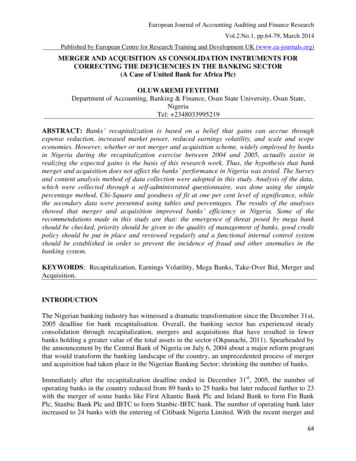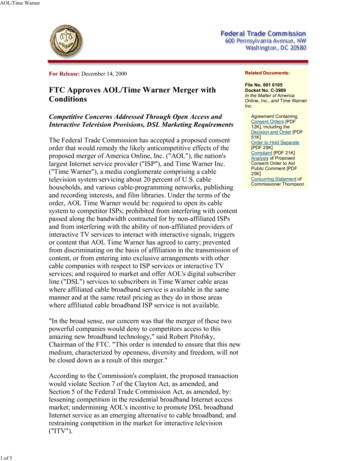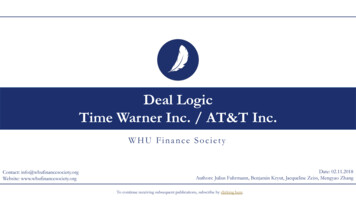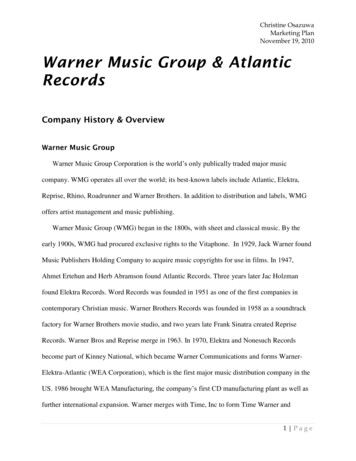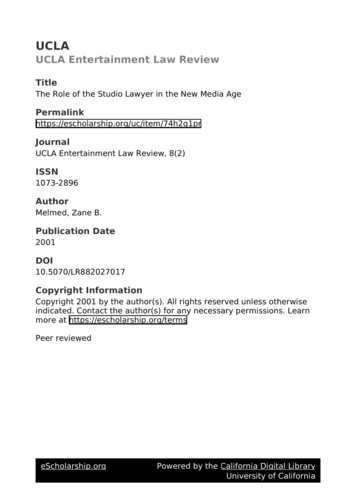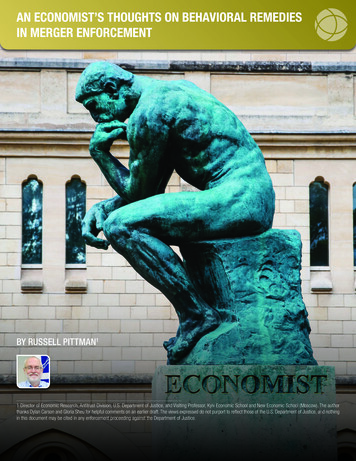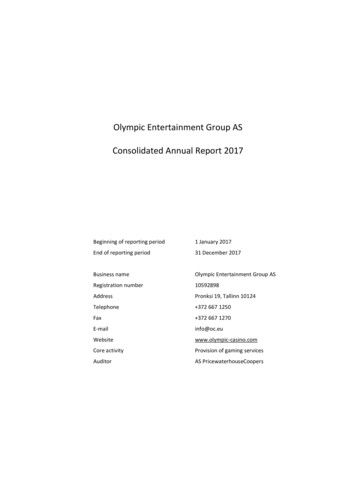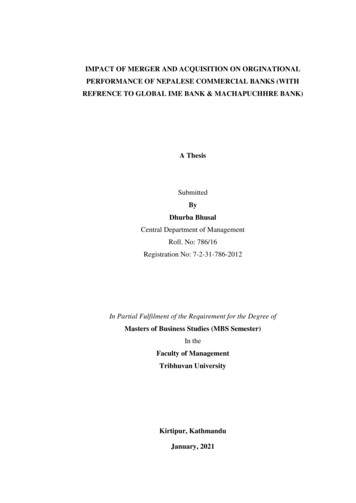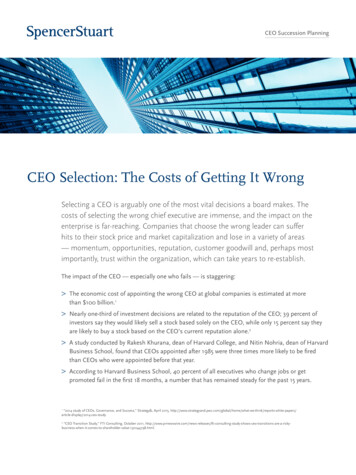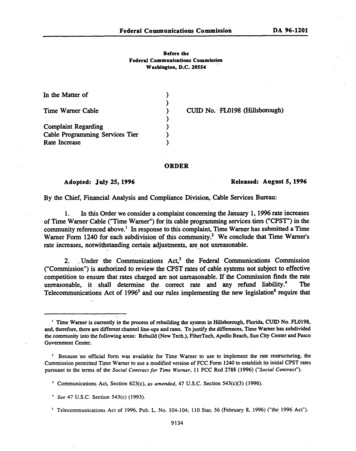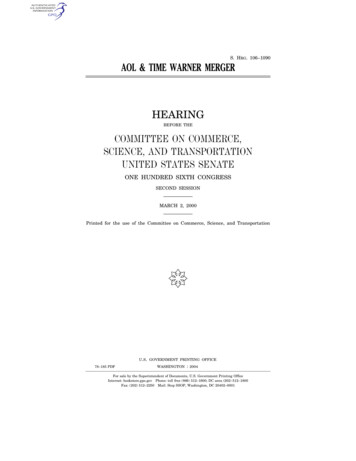
Transcription
S. HRG. 106–1090AOL & TIME WARNER MERGERHEARINGBEFORE THECOMMITTEE ON COMMERCE,SCIENCE, AND TRANSPORTATIONUNITED STATES SENATEONE HUNDRED SIXTH CONGRESSSECOND SESSIONMARCH 2, 2000Printed for the use of the Committee on Commerce, Science, and Transportation(U.S. GOVERNMENT PRINTING OFFICEWASHINGTON78–185 PDF:2004For sale by the Superintendent of Documents, U.S. Government Printing OfficeInternet: bookstore.gpo.gov Phone: toll free (866) 512–1800; DC area (202) 512–1800Fax: (202) 512–2250 Mail: Stop SSOP, Washington, DC 20402–0001VerDate 0ct 09 200208:00 Mar 04, 2004Jkt 078185PO 00000Frm 00001Fmt 5011Sfmt 5011S:\WPSHR\GPO\DOCS\78185.TXTJACKPsN: JACKF
SENATE COMMITTEE ON COMMERCE, SCIENCE, AND TRANSPORTATIONONE HUNDRED SIXTH CONGRESSSECOND SESSIONJOHN MCCAIN, Arizona, ChairmanTED STEVENS, AlaskaERNEST F. HOLLINGS, South CarolinaCONRAD BURNS, MontanaDANIEL K. INOUYE, HawaiiSLADE GORTON, WashingtonJOHN D. ROCKEFELLER IV, West VirginiaTRENT LOTT, MississippiJOHN F. KERRY, MassachusettsKAY BAILEY HUTCHISON, TexasJOHN B. BREAUX, LouisianaOLYMPIA J. SNOWE, MaineRICHARD H. BRYAN, NevadaJOHN ASHCROFT, MissouriBYRON L. DORGAN, North DakotaBILL FRIST, TennesseeRON WYDEN, OregonSPENCER ABRAHAM, MichiganMAX CLELAND, GeorgiaSAM BROWNBACK, KansasMARK BUSE, Republican Staff DirectorMARTHA P. ALLBRIGHT, Republican General CounselKEVIN D. KAYES, Democratic Staff DirectorMOSES BOYD, Democratic Chief Counsel(II)VerDate 0ct 09 200208:00 Mar 04, 2004Jkt 078185PO 00000Frm 00002Fmt 5904Sfmt 5904S:\WPSHR\GPO\DOCS\78185.TXTJACKPsN: JACKF
CONTENTSPageHearing held on March 2, 2000 .Statement of Senator Abraham .Statement of Senator Breaux .Statement of Senator Bryan .Statement of Senator Burns .Statement of Senator Cleland .Statement of Senator Dorgan .Statement of Senator Gorton .Statement of Senator Hollings .Prepared statement .Statement of Senator Rockefeller .Statement of Senator Stevens .Statement of Senator Wyden .138761754336304WITNESSESBerman, Jerry, Executive Director, Center for Democracy and Technology .Prepared statement .Case, Steve, Chairman and CEO, America Online .Prepared statement .Kimmelman, Gene, Co-Director, Washington Office, Consumers Union .Prepared statement .Lande, Robert H., Senior Research Scholar, American Antitrust Institute .Prepared statement .Levin, Gerald, Chairman and CEO, Time Warner, Inc. .Prepared statement .5153811646690911316(III)VerDate 0ct 09 200208:00 Mar 04, 2004Jkt 078185PO 00000Frm 00003Fmt 5904Sfmt 5904S:\WPSHR\GPO\DOCS\78185.TXTJACKPsN: JACKF
VerDate 0ct 09 200208:00 Mar 04, 2004Jkt 078185PO 00000Frm 00004Fmt 5904Sfmt 5904S:\WPSHR\GPO\DOCS\78185.TXTJACKPsN: JACKF
AOL & TIME WARNER MERGERTHURSDAY, MARCH 2, 2000U.S. SENATE,TRANSPORTATION,Washington, DC.The Committee met, pursuant to notice, at 10:35 a.m. in roomSR–253, Russell Senate Office Building, Hon. Conrad Burns presiding.COMMITTEEONCOMMERCE, SCIENCE,ANDOPENING STATEMENT OF HON. CONRAD BURNS,U.S. SENATOR FROM MONTANASenator BURNS. The Committee will come to order. I would liketo welcome everyone here today to this hearing, which concerns anissue of critical importance to the future development of the Internet, the proposed merger of two massive players in the Internet access and media content fields, and that has to do with America Online and Time Warner.The purpose of the America Online-Time Warner merger wouldbe, or the proposed merger, I should say, would be the largestmerger in history. The amount of money involved is staggering.The initial price on the January 10 announcement was over 156billion.This Committee takes its oversight role very seriously, particularly when scrutinizing a combination of such unprecedented scope.Of particular importance in fulfilling the Committee’s due diligenceduty is a close examination of the potential effects on consumersof such an immense company.AOL has about 21 million subscribers today, which is about sixtimes larger than the nearest competitor for Internet service, andthat is MindSpring. Time Warner is the Nation’s second largestcable provider, with a vast array of video, music, and print contentthat pervades America’s every-day life.From the checkout stands in the afternoon to the couch at homein the evening, clearly the proposed combined company has the potential to use the vast power for the good of America. However,while the proposed merger before this Committee has the potentialto provide consumer benefits, we also know the difference betweenpotential and reality. While the combination of Time Warner’senormous treasure trove of content and America Online’s 21 million subscribers could provide exciting new services, several seriouspublic policy issues are raised by the creation of such a potentiallydominant entity.In assessing the potential future effects of the proposed merger,it is usually most helpful to look at the current market behavior(1)VerDate 0ct 09 200208:00 Mar 04, 2004Jkt 078185PO 00000Frm 00005Fmt 6633Sfmt 6633S:\WPSHR\GPO\DOCS\78185.TXTJACKPsN: JACKF
2of the players involved. With this in mind, I am particularly troubled by the recent developments in the instant messaging area. Instant messaging is a real time chat format which allows users tocommunicate quickly and cheaply with each other.America Online alone has over 45 million registered subscribers,and after its 1998 purchase of ICQ, the major alternative instantmessaging system, currently commands over 80 million messagingusers overall. These users generate nearly a billion messages a day,far more than the entire mail volume of the United States PostalService.The mode of communications is especially popular with youngpeople, who favor it over traditional telephone conversation inmany cases. As we all know, what has made the U.S. telephonenetwork the envy of the world, and a tremendous positive economicforce, it is the fact that it is available everywhere to all users. Thefact that anyone can access the network makes it vastly more valuable to everyone.The spectacular growth of the Internet itself was made possibleby the development of open networks, not closed systems. Unfortunately, in the instant messaging area, I fear we are headed in theother direction. Just yesterday my colleague, Senator Hollings andI were presented with a letter from all of the major competitorsthat offer instant messaging services stating that their productsare being purposely blocked by the dominant provider of such services, America Online. This letter was signed by many companies,including AT&T, AltaVista, Prodigy, and others too numerous tomention here.This very Committee heard just last summer that serious effortswere being undertaken by America Online to deal in good faithwith these interoperability problems so that all consumers couldbenefit. In a July statement issued by the chairman of the workinggroup designed to solve these problems, AOL stated that it, quote,believes that users should be able to exchange messages regardlessof which product they use.AOL also said it was, I quote, fast-tracking these efforts. Well,it is 7 months later, and these blocking problems are more evidentthan ever, and I look forward to the testimony of the witnesses toclarify these recent events.Another issue that many Members of this Committee will be interested in, I assume, would be the so-called open access. I followedwith great interest the announcement on Tuesday of this week thatAOL and Time Warner committed to give their broadband cablecustomers direct access to Internet service providers on a nondiscriminatory basis. While I was never in favor of Government intrusion and regulation of the cable networks, I applaud the effortsto reach privately negotiated settlements.I should add that while the memorandum appears to be a positive first step, on closer inspection several questions are raisedabout how binding such agreement will be, and I look forward toa more detailed description of how this understanding would translate into the marketplace with our witnesses, and I look forwardto your testimony today.I would also like to invite Mr. Case and Mr. Levin if theywould—March 21, we kick off this year’s activities in the InternetVerDate 0ct 09 200208:00 Mar 04, 2004Jkt 078185PO 00000Frm 00006Fmt 6633Sfmt 6633S:\WPSHR\GPO\DOCS\78185.TXTJACKPsN: JACKF
3Caucus, and we will invite both of you to be a part of that, comingup on March 21. You might have your people put that on your calendar, and I thank you for coming today.Now I turn to my good friend, Senator Hollings.STATEMENT OF HON. ERNEST F. HOLLINGS,U.S. SENATOR FROM SOUTH CAROLINASenator HOLLINGS. Thank you, Mr. Chairman. I think I can saveus time by including my statement in the record here at this point.Let me thank the staff for preparing this statement, because I amnot intelligent enough to prepare one on this subject.Things are breaking so fast, and we come from a policy of openaccess, and not having control of both content and message. Thathas been constant throughout our history with TV. Both of youfolks at the table are way smarter than we are, but you understandthat in the television industry we would not even let the networksproduce their own programs. That was to try, under the FirstAmendment, freedom of speech, more flexible programs than otherwise, and even in the 1996 Telecommunications Act, I rememberwe put in there for the Bell Companies if they got into video programming that they have open access, nondiscriminatory conductand everything else.Now, what I am trying to see is, we have seen the tremendousmerging of content and delivery, and anybody that studied John D.Rockefeller—who did not make his money on oil, he made hismoney on the distribution and delivery of that oil, and I see thatyou smart folks are really producing—and I will wait my turn forthe questions, but it looks to me you all are running down—you allhave got the Microsoft book, going right, straight down the Microsoft route that has got them in court right now, but I do thank you,and I would yield to my colleagues.[The prepared statement of Senator Hollings follows:]PREPARED STATEMENT OF HON. ERNEST F. HOLLINGS,U.S. SENATOR FROM SOUTH CAROLINAThe merger of AOL and Time Warner represents the synthesis of old and newmedia, narrowband and broadband, and content and delivery systems. It also represents the union of the world’s largest Internet service provider and the world’sbiggest entertainment and media company. As such, it raises several public policyconcerns that require significant examination. AOL has 23 million subscribers, six times larger then its biggest Internetcompetitor. According to the International Data Corp (IDC), a Massachusetts researchand financial data firm, AOL controls more than 40 percent of the Internetservices market. Time Warner controls the second largest cable system in the country, owns20 percent of the cable lines and serves 12.6 million cable customers. Time Warner produces its own content and owns CNN Network News,Cinemax, HBO and TNT, as well as Warner Brothers’ movies. On the print side, the company publishes numerous popular magazines suchas Time, People, Sports Illustrated, Southern Living, Fortune and Money, whichare read by 120 million people.There is tremendous potential for the exercise of undue market power and the discriminatory treatment of its competitors by this merged company. AOL already hasused its market clout to forge agreements with top computer manufacturers to haveits Internet access service bundled on new computers. This of course was the basisfor the Microsoft anti-trust suit by Justice. In fact, that suit was directly tied toVerDate 0ct 09 200208:00 Mar 04, 2004Jkt 078185PO 00000Frm 00007Fmt 6633Sfmt 6621S:\WPSHR\GPO\DOCS\78185.TXTJACKPsN: JACKF
4Netscape which is now owned by AOL. Now under this new agreement, new computers purchased from Dell, Compaq, and Gateway will have AOL’s software.It also is my understanding that AOL has developed a new 5.0 software that reportedly disables its competitors when installed on a user’s computer, and is thesubject of class action litigation in Arizona, Washington and Oregon. In order to rectify the problem consumers must call the AOL help line and reprogram their computer. While AOL is espousing nondiscriminatory treatment and choice, it is usingsoftware that makes it difficult to use multiple service providers. Will there be otherchanges in the Internet’s architecture or AOL’s software that will make it difficultfor others to compete on a level playing field against AOL.Finally, this transaction raises the potential for discriminatory practices with respect to content delivered over the Internet/cable platform that will be deployed byAOL-Time Warner. When we passed the cable act in 1992, we were acutely awareof the dangers posed by the vertical combination of both content and distributionsystems, and the inevitable temptation of the owner of both the content and distribution system to discriminate against their competitors. Then, in the Telecommunications Act of 1996, we included a provision to ensure that if the telephonecompanies provided video programming, they could not ‘‘unreasonably discriminate. . . with regard to material or information (including advertising) provided by theoperator to subscribers . . . or in the way . . . material or information is presentedto subscribers.’’ Now we have a cable-Internet merger in which economic incentiveswill exist to favor their content, news, material, and information, over that of competing content and news information providers. The FTC and Congress should seriously consider whether this combination should be subject to similar principles ofnon-discrimination.I look forward to the testimony of our witnesses today on these important issues.Senator BURNS. Thank you very much. Senator Gorton.STATEMENT OF HON. SLADE GORTON,U.S. SENATOR FROM WASHINGTONSenator GORTON. Mr. Chairman, in listening to both you andSenator Hollings I share many of your apprehensions. This is ahuge merger. It looks as though it could easily lead us to a pointwhere we have only a handful of major providers in the most dynamic part of our economy, and I share many of the reservations,though not necessarily all of the conclusions of the three membersof the second panel that is going to appear before us here today.And I think it is right and proper on your part that we shouldtake a very careful view of this merger, and should review it withat least a sufficient degree of apprehension that we require a heavyburden of proof on the two merging partners, and that they are notgoing to lessen competition and openness in the field together, andthey play such a dominant role in.Senator BURNS. Thank you very much. Senator Wyden.STATEMENT OF HON. RON WYDEN,U.S. SENATOR FROM OREGONSenator WYDEN. Thank you, Mr. Chairman. I will be very brief,and I want to pick up on what Senator Hollings said. It seems tome that in the 21st Century the money is to be made in interactivity, and I think when you look at the vision that the two ofyou have discussed with this merger. I think your vision is whatwe will need to examine. There are two areas in particular that Iwould look at with you.First, because of the size of this merger and the number of people involved, to a great extent what the two of you are doing isgoing to have enormous ramifications for privacy policy in thiscountry. Senator Hollings has a lot of good thoughts on this. Sen-VerDate 0ct 09 200208:00 Mar 04, 2004Jkt 078185PO 00000Frm 00008Fmt 6633Sfmt 6601S:\WPSHR\GPO\DOCS\78185.TXTJACKPsN: JACKF
5ator Burns and I have a bipartisan bill with respect to this issue.Senator Kohl has signed on to it.Mr. Case, I heard you say a couple of days ago that you were essentially ready to back privacy legislation and, given the fact thatthis is perhaps number 2 now in the polls with respect to theAmerican people, I would like to see you outline your views on privacy this morning. You will be asked about what you think the elements of a good privacy statute ought to be. That is number 1.The second area, so that you two will be aware of what I amgoing to ask, is this question about how to make sure that thereis no discrimination against unaffiliated content providers. As youknow, there is great concern in this country with respect to all ofthe other content providers who are not affiliated with your systemabout how they are going to get a fair shake, and I would like tohave you all outline how it is that those folks are going to be treated fairly, so we do not end up in a country where, to get some ofthose content providers, people have got to scroll along for eons inorder to get access to those materials. That is what I will be asking.Mr. Chairman, I look forward to working with you and SenatorHollings in a bipartisan way.Senator BURNS. Thank you very much. Senator Dorgan.STATEMENT OF HON. BYRON L. DORGAN,U.S. SENATOR FROM NORTH DAKOTASenator DORGAN. Mr. Chairman, thank you very much. Let methank Mr. Case and Mr. Levin for coming today. I have spoken atsome length about my concern about concentration. That is not asecret. My concern about concentration deals especially with thequestion of how does concentration affect competition?When we rewrote the Telecommunications Act our interest wasin fostering aggressive, robust competition, and that is what I amgoing to be interested in today. How does this merger affect competition?And let me also say that I think privacy matters a great deal.As Senator Wyden indicated, privacy is one of the policy areas thatwe are very interested in.And I would also say that I was surprised and also found appealing the announcement earlier this week about open access. I thinkthat is certainly a step in the right direction, but we must be concerned, as all of us proceed, about the competitive forces that canexist in the marketplace in telecommunications and entertainment.What are the competitive forces that will allow the consumer, thebest possible product at the best possible price? I am interested inhearing all of the witnesses discuss today the effect of this proposed merger on those issues.Again, both of you are very successful businessmen who havebuilt interesting and wonderful companies. Let me just say thatwith respect to the 1 billion instant messages, my children contribute a lot to that 1 billion a day, regrettably. We are workingon paring that down just a bit.But this is a fascinating time and a fascinating industry. I amvery interested in your presentations, and the presentation of thepanel following you.VerDate 0ct 09 200208:00 Mar 04, 2004Jkt 078185PO 00000Frm 00009Fmt 6633Sfmt 6601S:\WPSHR\GPO\DOCS\78185.TXTJACKPsN: JACKF
6Senator BURNS. Thank you very much. Senator Bryan.STATEMENT OF HON. RICHARD H. BRYAN,U.S. SENATOR FROM NEVADASenator BRYAN. Thank you very much, Mr. Chairman, for convening this important hearing, and thanks to our distinguishedwitnesses for appearing here today. I think this merger raises somepotentially troubling implications in terms of public policy, and atleast two areas that are of concern to me have been mentioned bymy colleagues. These areas include the impact this merger has oncompetition, and whether there will be open access.Mr. Case, you appeared before this Committee last year, prior tothe merger. At that time you made, I thought, a very compellingargument. You urged us to consider having the FCC open a rule.I want to explore whether or not, after the announcement, youthink we need to followup on that with some additional action, either at the regulatory level or at the legislative level and, as twoof my colleagues have mentioned previously, the issue of privacy isnot just a phantom issue. It is not ephemeral. It is an issue thatI hear from my colleagues and from my constituents virtually everyday.The Wall Street Journal did an opinion poll sampling last yearwith a focus on the millennium. What are the concerns that mostAmericans have in the next century? It was an open-ended poll.The single largest responding category at 29 percent expressed aconcern about loss of privacy. I want to explore those issues withyou, as I know a number of my colleagues may.Again, I look forward to the opportunity to ask some questions,and thank you, Mr. Chairman.Senator BURNS. Thank you, Senator.Senator Rockefeller, I wonder if you might autograph one ofthose books that Senator Hollings was referring to.[Laughter.]STATEMENT OF HON. JOHN D. ROCKEFELLER IV,U.S. SENATOR FROM WEST VIRGINIASenator ROCKEFELLER. That is on distribution and not on collection.[Laughter.]I would say to our two witnesses that I do not necessarily startout skeptically on this merger. There are a number of questionsthat I need to have answered, and time will help us do that as wellas this hearing. This whole phenomenon of the new economy ismoving forward, and I am not inclined to try to stop it unless itis unwilling to address certain areas I think that you will be, andI have some questions for you about this, but you know, the privacyquestion is huge.Senator Hollings has asked me to do some work on that, and Iam going to because he has asked me to and also because I thinkit is a huge issue. Another important issue is the whole questionof not undermining consumer choice when it comes to broadband.But I do not start out skeptically. I start out with an open mind,and a willingness to hear how you respond to what people have tosay because that is what hearings are for, and you have both theVerDate 0ct 09 200208:00 Mar 04, 2004Jkt 078185PO 00000Frm 00010Fmt 6633Sfmt 6601S:\WPSHR\GPO\DOCS\78185.TXTJACKPsN: JACKF
7FTC and the FCC to go through. The FCC doesn’t ordinarily turndown mergers of this sort. The FTC may very well approve it, I donot know, but your presence here is important, and how you answer questions will be extremely important.Thank you, Mr. Chairman.Senator BURNS. Thank you, Senator.Senator Stevens.Senator STEVENS. I applaud the merger. I am happy to be hereand hear your statements. I hope my colleagues will let us get tothat.Senator BURNS. Thank you, Senator Stevens.Senator Breaux.STATEMENT OF HON. JOHN B. BREAUX,U.S. SENATOR FROM LOUISIANASenator BREAUX. Now, should I say anything?[Laughter.]Well, I thank the chairman, and I think you can tell the scopeof this hearing is very important because you have heard fromevery Member of the Committee, and that is what happens whenthe subject matter is as important as this.You know, it seems like now more and more we have less andless. I mean, it seems like every day we have fewer oil and gascompanies, fewer airlines, fewer railroads, and fewer telecommunications companies in this country, and big is not necessarily bad,but this is a country, as all of you know who are very competitivein your fields, that has been built on competition. The question Ithink we legitimately need to look at is how, when you have lessand less, do you have more competition? It is a legitimate question.I know you are prepared to respond to it, and I look forward toyour response.Thanks.Senator BURNS. Senator Cleland.STATEMENT OF HON. MAX CLELAND, U.S. SENATOR FROMGEORGIASenator CLELAND. Thank you very much, Mr. Chairman. I am intrigued at this possibility this morning of our hearing. As a Democrat, I do not get a chance to encounter billionaires very often, soI just came to sit and stare.[Laughter.]Additionally, coming from Georgia——Senator BREAUX. You look at Rockefeller every day. We’ve gotone.Senator CLELAND. But he’s ours.[Laughter.]Knowing the history of TBS in Atlanta, and how it became TimeWarner, and knowing Ted Turner as I do, I am also fascinated tosee the guy who attempts to be Ted Turner’s boss.[Laughter.]So we welcome you both today. Let me just say, in 1966 TimeWarner did purchase TBS in Atlanta. A few months after thatmerger the TBS subsidiaries of Time Warner employed almost8,000 employees worldwide, and almost 5,000 in Georgia, and todayVerDate 0ct 09 200208:00 Mar 04, 2004Jkt 078185PO 00000Frm 00011Fmt 6633Sfmt 6601S:\WPSHR\GPO\DOCS\78185.TXTJACKPsN: JACKF
8those numbers have risen to over 9,000 employees worldwide andover 5,500 located in Georgia, so I think that was a good purchaseand a good deal.As the TBS continues to launch new products, these numberswill continue to grow, I am sure, and create growth in other segments of our economy in Georgia and in the country. Now themerger we are discussing today has the potential, I think, to imitate many of these same positive results.It involves two dynamic leaders and two powerful industries, andit is no coincidence that it was announced just hours into what Mr.Levin has coined the Internet Century. I am very interested inlearning how the merging of TV, movies, print media, with theInternet can really help average Americans, can help the consumer.The proposed merger between AOL and Time Warner, the largest in U.S. history, offers a tremendous opportunity to help shapethe future of the Internet. This understandably creates a great dealof interest, speculation, and some anxiety. There is really no precedent for the merger of a media provider and an Internet provider.It leaves the merger open to interpretation of what is likely to happen.I personally am looking at this with great optimism and hopeand faith, and belief in AOL and Time Warner that they will takefull responsibility in this incredible undertaking.From the public interest standpoint, it is AOL and Time Warner’s responsibility, I think, to handle the future in such a mannerthat your handling of both distribution and content will notproduce an unfair advantage in the marketplace. Many of yourcompetitors are expected to follow your lead in the future, so youhave a grave responsibility to lead us all bravely and courageouslyand responsibly into the 21st Century.Many have already formed opinions on what the future holds,but nobody really knows what the future may hold. I am particularly interested in this in terms of the bottom line, what it does tothe life of the average American. Does this merger help the averageconsumer of goods and services and information in America? I willbe looking forward to your responses.Thank you very much, Mr. Chairman.Senator BURNS. Thank you, Senator. Twenty years of officiatingfootball, I assume the captains have introduced themselves. I willtoss the coin to see who gets to kick and who gets to receive, butwhoever would like to lead, and we welcome Steve Case and GerryLevin, and we appreciate your attendance here this morning, asthere is quite a lot of swirl around this proposed merger, and a lotof information, so we thank you for coming this morning, and whoever would like to lead.STATEMENT OF STEVE CASE, CHAIRMANAND CEO, AMERICA ONLINEMr. CASE. I will start. We certainly understand the ground rulesin terms of who is kicking and who is receiving. You get to kick,and we are here to respond as best we can.[Laughter.]Senator Burns, I really enjoyed your opening statement, but thenyou came to the however, and it got a little more troubling. I lookVerDate 0ct 09 200208:00 Mar 04, 2004Jkt 078185PO 00000Frm 00012Fmt 6633Sfmt 6601S:\WPSHR\GPO\DOCS\78185.TXTJACKPsN: JACKF
9forward to talking about instant messaging, and privacy, and openaccess, and some of the other issues that have been raised, and Iapologize to Senator Rockefeller for somehow having his familyname dragged into this.[Laughter.]I also am reluctant to go forward with this statement after Senator Stevens’ comments, but I do think it answers many of thequestions that have been raised. As a starting point I think itwould be worth moving through it, and I will try to do it quickly.We see this merger, as you might imagine, as an opportunity toincrease consumer choice and to spur new innovation, and to buildfurther on notions of consumer trust and confidence and to really—I think it is something you all referenced in your comments, to extent the benefits of this Internet revolution to everybody.In a few short years the Internet has already begun to transformour every-day lives and our businesses, and our schools certainly,and our homes, and also in our Government today we are on theverge of what we think will be a second Internet revolution, andit is a time of incredible innovation and intense competition.We welcome that competition, because we believe our companiesand this new company will be stronger because of it, so while w
Time Warner controls the second largest cable system in the country, owns 20 percent of the cable lines and serves 12.6 million cable customers. Time Warner produces its own content and owns CNN Network News, Cinemax, HBO and TNT, as well as Warner Brothers' movies. On the print side, the company publishes numerous popular magazines such
